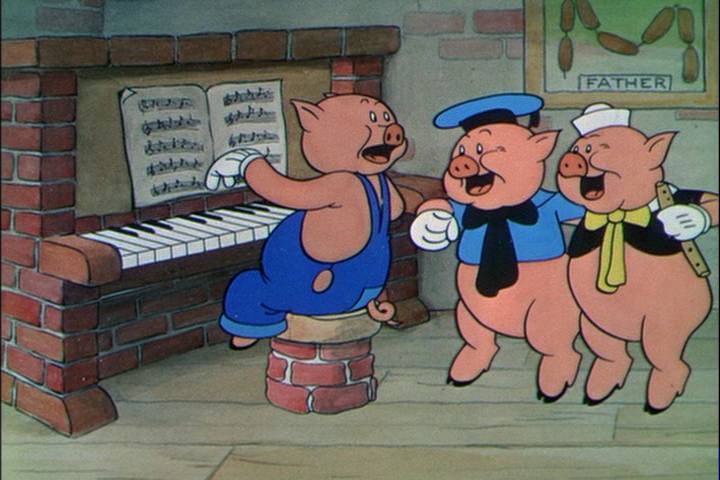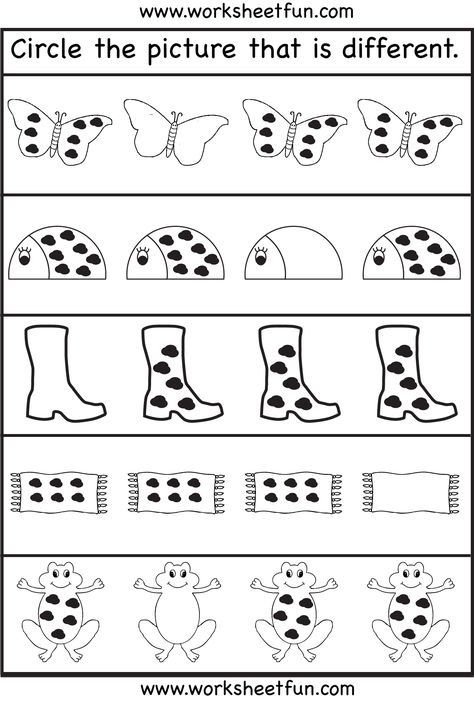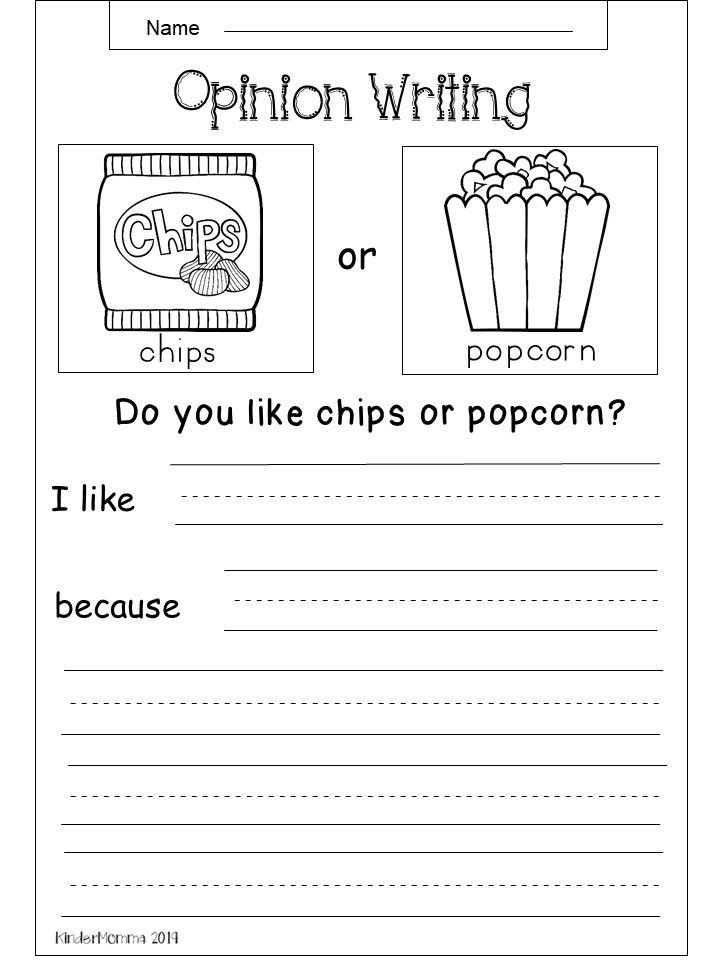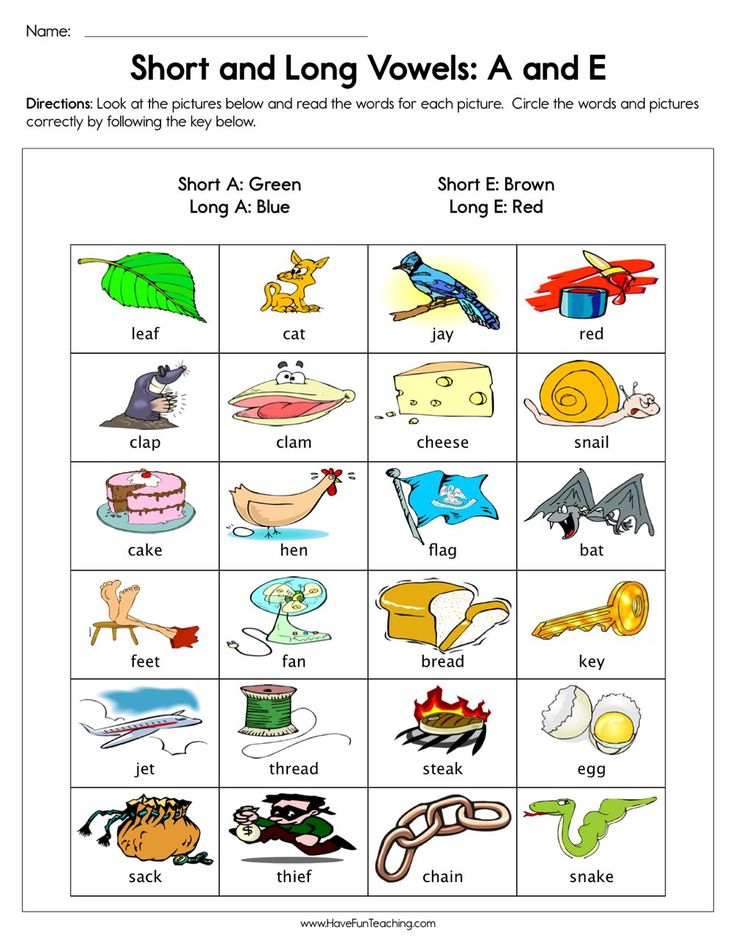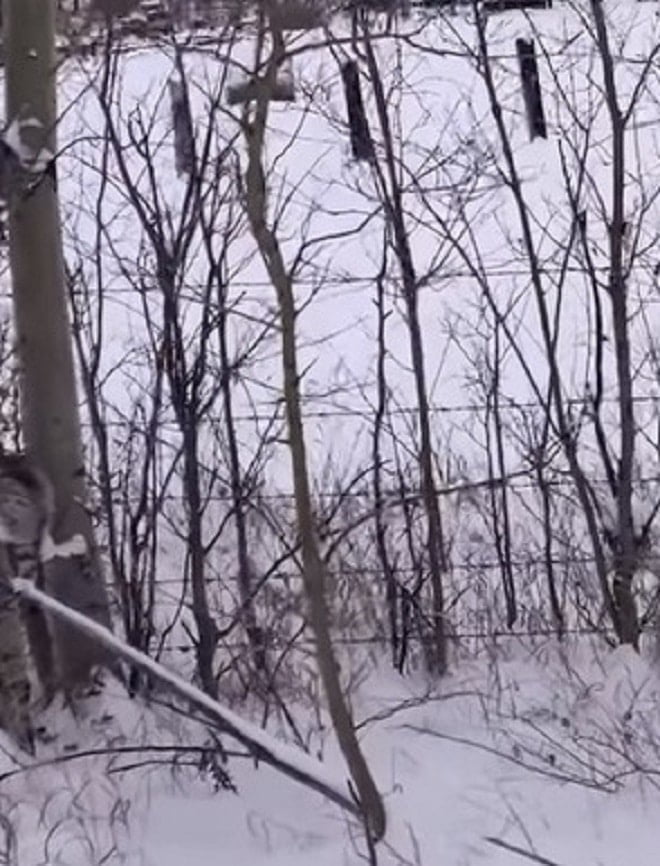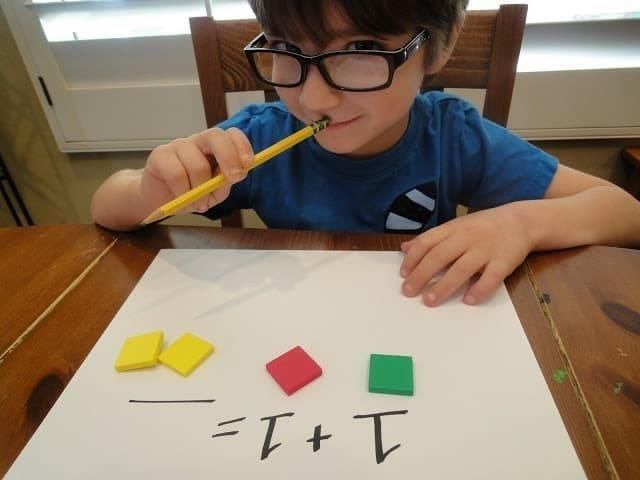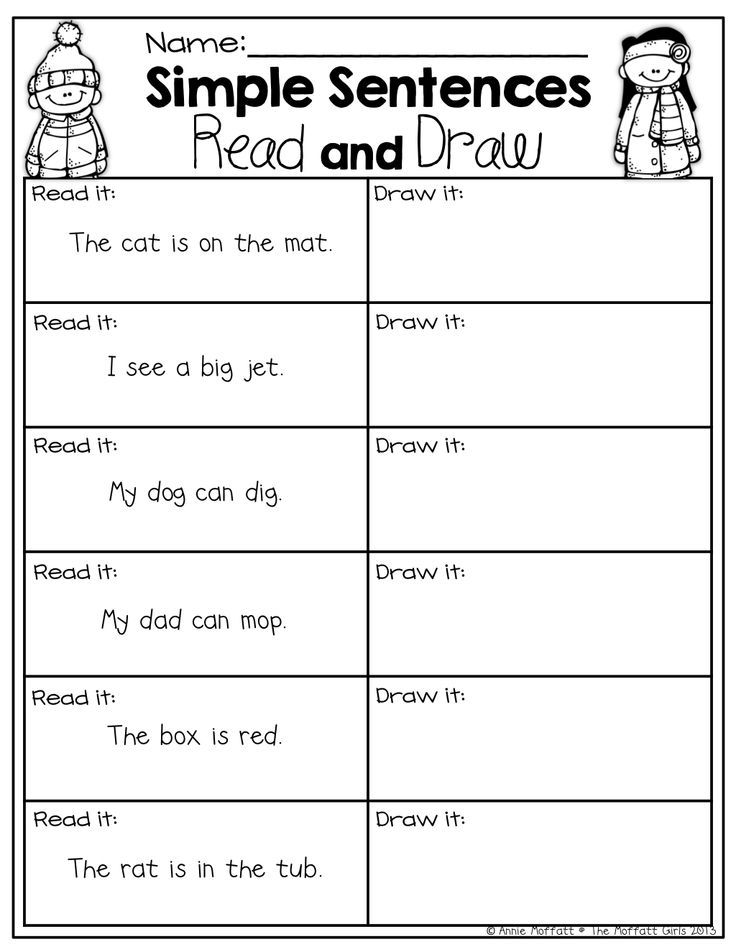Three little pigs name
What name went with what pig in 'The Three Little Pigs'?
There is a 19th century version from Scotland; "The Three Wee Pigs." The protagonists were called Dennis, Biddy, and Rex, and they were kicked out of the old sow's house because Dennis had accidentally stepped on one of the new piglets. They got caught in a horrible snow and rain storm; when Biddy saw a cart of straw he quickly built a house. Soon they bumped into a pig named Jimmie McLaughlin, "who was at school with Dennis. " Jimmie felt sorry for them and gave them some wooden slats. ("Son, school is where you'll make the important connections.") Finally, a man came by with bricks and Rex built a house out of them. After the requisite huffing and puffing, the wolf knocks down the first two houses but gets stuck in the chimney of the brick house. "So they hooked him down the chimney, and cut him up into collops, and roasted him for their supper.
" The story concludes. "But there are no houses up in the wood now, for the pigs were all taken to the old people's houses, and there they died."
https://books.google.com/books?id=srQCEQdZ1M0C&pg=PA129&lpg=PA129&dq=Dennis,+Biddy,+and+Rex&source=bl&ots=_Fai3nZL80&sig=44NPLWB9Rox_TuGvKf0irwRYL44&hl=en&sa=X&ved=0ahUKEwiQ_q2_jtPOAhWJ4SYKHU-8AYsQ6AEIFDAA#v=onepage&q=Dennis%2C%20Biddy%2C%20and%20Rex&f=false
There is another 19th century version from England; "Three Little Pigs." (According to an authoritative collection called 'A Dictionary of British Folk Tales,' edited by Katherine O. Briggs.) The protagonists were called Browny, Whitey, and Blacky In this version, also told at least as far back as 19th century England, the language was explicitly moralistic. In this case, the three pigs were Browny, who "spent most of his time rolling and wallowing about in the mud," Whitey, who was gluttonous and greedy, and "the youngest and best looking, Blacky," who is "a good, nice little pig, neither dirty nor greedy.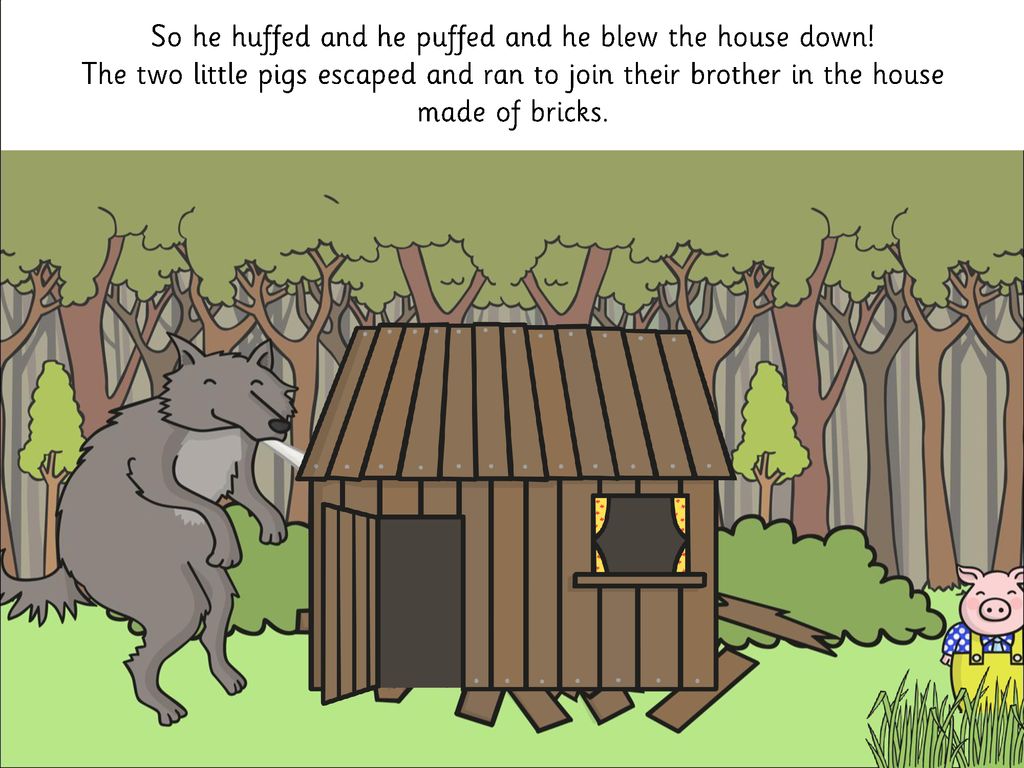 He had nice dainty ways (for a pig), and his skin was always as smooth and shining as black satin." One day the old sow tells her kids that before she dies she wants them to build houses and quizzes them on how they would do it. Browny says "a house of mud," to mom's disappointment. She asks Whitey. "A house of cabbage," answers Whitey, with a mouth full, and scarcely raising her snout out of the trough in which she was grubbing for some potato-parings." "Foolish, foolish child!" said the mother pig. Finally she asked Blacky, who says, "A house of brick, please mother, as it will be warm in winter and cool in summer, and safe all the year round." The predator in this version is a fox, not a wolf. The fox quickly burrows his way through the mudwalls--no huffing or puffing--and carries poor Browny" off with him to his den." The fox then eats through the cabbage walls and carries poor "trembling, shivering" Whitey away to join her brother. When the fox fails to scratch through the brick wall, he goes down the chimney and gets captured, boiled, and eaten.
He had nice dainty ways (for a pig), and his skin was always as smooth and shining as black satin." One day the old sow tells her kids that before she dies she wants them to build houses and quizzes them on how they would do it. Browny says "a house of mud," to mom's disappointment. She asks Whitey. "A house of cabbage," answers Whitey, with a mouth full, and scarcely raising her snout out of the trough in which she was grubbing for some potato-parings." "Foolish, foolish child!" said the mother pig. Finally she asked Blacky, who says, "A house of brick, please mother, as it will be warm in winter and cool in summer, and safe all the year round." The predator in this version is a fox, not a wolf. The fox quickly burrows his way through the mudwalls--no huffing or puffing--and carries poor Browny" off with him to his den." The fox then eats through the cabbage walls and carries poor "trembling, shivering" Whitey away to join her brother. When the fox fails to scratch through the brick wall, he goes down the chimney and gets captured, boiled, and eaten.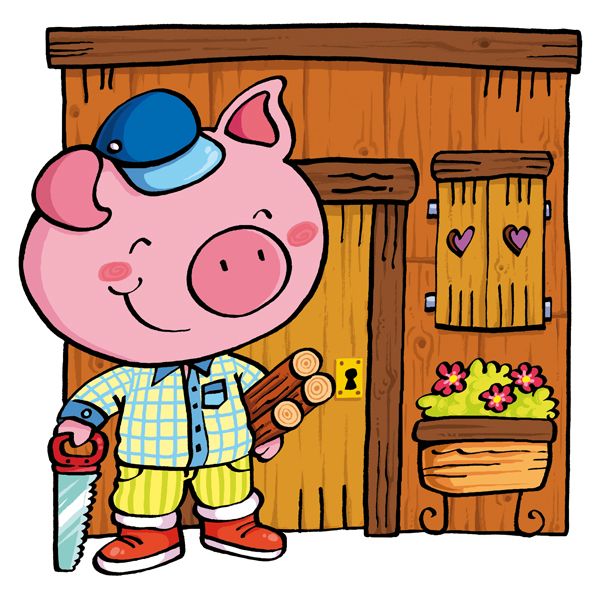 Then, Blacky goes to rescue his siblings." As he approached the den he heard piteous grunts and squeals from his poor little brother and sister who lived in constant terror of the fox killing and eating them." He busts them out, they joyfully thank him, and they live happily ever after in Blacky's brick house. In case the moral is not yet clear, the story ends, "And Browny quite gave up rolling in the mud and Whitey ceased to be greedy, for they never forgot how nearly these faults had brought them to an untimely end."
Then, Blacky goes to rescue his siblings." As he approached the den he heard piteous grunts and squeals from his poor little brother and sister who lived in constant terror of the fox killing and eating them." He busts them out, they joyfully thank him, and they live happily ever after in Blacky's brick house. In case the moral is not yet clear, the story ends, "And Browny quite gave up rolling in the mud and Whitey ceased to be greedy, for they never forgot how nearly these faults had brought them to an untimely end."
https://ebooks.adelaide.edu.au/l/lang/andrew/l26gr/chapter10.html
Disney, it seems, combined the basic plot devices of the first 19th century version --huffing, puffing, wolves, straw, sticks -- with the clear moral dictates of the second. The Disney version of the "Three Little Pigs" was produced in 1933. Pig number one, "Fifer Pig," sings, "I build my house of straw, I build my house of hay, I toot my flute, I don't give a hoot, I play around all day. " The "Fiddler Pig" sings, "I build my house of sticks, I build my house of twigs. With a hey diddle diddle, I play my fiddle, and dance all kinds of jigs." The dour third pig, named "the Practical Pig," sings, "I build my house of stone, I build my house of bricks. I have no chance to sing and dance, because work and play don't mix." Piper and Fiddler are openly contemptuous of their brother but he reacts with mature self-confidence, shaking his trowel at them and singing, "You can play and laugh and fiddle. Don't think you can make me sore. I'll be safe and you'll be sorry when the wolf comes to your door." They mock him and then break into the famous rendition of the song, "Who's Afraid of the Big Bad Wolf."
" The "Fiddler Pig" sings, "I build my house of sticks, I build my house of twigs. With a hey diddle diddle, I play my fiddle, and dance all kinds of jigs." The dour third pig, named "the Practical Pig," sings, "I build my house of stone, I build my house of bricks. I have no chance to sing and dance, because work and play don't mix." Piper and Fiddler are openly contemptuous of their brother but he reacts with mature self-confidence, shaking his trowel at them and singing, "You can play and laugh and fiddle. Don't think you can make me sore. I'll be safe and you'll be sorry when the wolf comes to your door." They mock him and then break into the famous rendition of the song, "Who's Afraid of the Big Bad Wolf."
http://www.kennythepirate.com/2013/01/23/limited-time-magic-long-lost-friends-week-robin-hood-friar-tuck-prince-john-and-sherrif-of-nottingham/fiddler-fifer-practical-pig-big-bad-wolf-4-2/
[Links confirmed as working on August 21, 2016 by shuehorn]
The Three Little Pigs
Once upon a time, there were three little pigs, named Peter, Patty and Penny,
who left their mommy and daddy to see the world.
All summer long, they roamed through the woods and fields, playing games and having fun. None were happier than the three little pigs, and they easily made friends with everyone they met.
Wherever they went, they were given a warm welcome and never had to worry about where they would sleep. But as summer drew to a close, they realized that people were starting to prepare their homes for winter. The three little pigs decided that they too needed a home of their own to keep them safe and warm through the winter.
Peter, the first little pig, was the oldest of the three. He decided to build a straw hut. "It'll only take a day! Then I'll go have fun and play," he sang enthusiastically.
The others disagreed.
"It's too fragile," they said disapprovingly, but Peter refused to listen (after all, he WAS the oldest by 3 whole minutes).
Patty Pig was the second little pig (born 3
minutes after Peter and 4 seconds before Penny).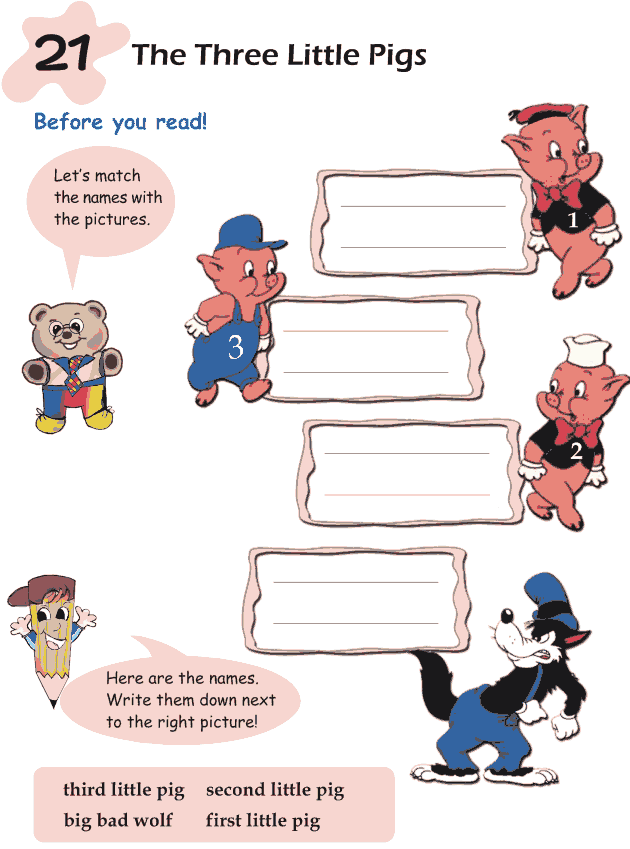 She decided that a house of straw
would be too cold during the winter (and that bugs might get in!) So she went off in
search of twigs and wood to build her house.
She decided that a house of straw
would be too cold during the winter (and that bugs might get in!) So she went off in
search of twigs and wood to build her house.
"Clunk! Clunk! Clunk!" It took her two days to nail her house of wood together. Patty finished, looked at her house and thought, "well..., it's a little wobbly and maybe it isn't my VERY best job... But it's supposed to be warm this winter so it should do."
Penny quietly voiced her opinion that the house didn't look sturdy enough to stand up to wind, rain, snow (or bugs). Peter teased that Patty had wasted a whole day searching for wood when she could have been having fun playing with him. Patty turned and sang out, "It only took an extra day. Now I can go have fun and play."
Penny Pig was the youngest of the three and being
the youngest loved to play at least as much as Peter and Patty did. But she
remembered what her mommy and daddy had taught her growing up.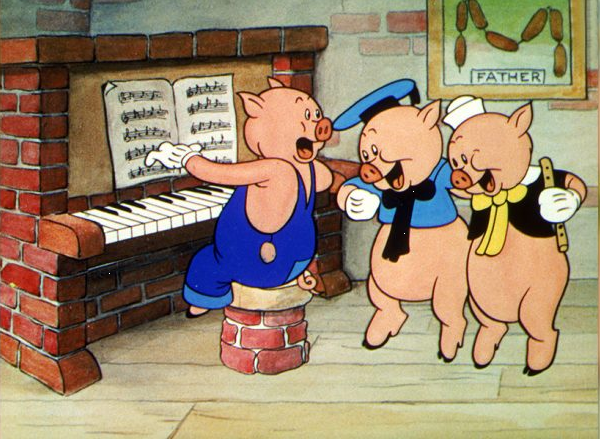
Her daddy always told her, "we don't expect you to be perfect Penny."
And her mommy always added, "we'll always be proud of you as long as you've done your very best job."
So Penny Pig sighed and thought, "it will take time, patience and hard work to build a safe, warm, comfortable house. I've never done it before and I'm a little nervous, but I'm going to do my very best job!"
Penny went to the library and took out some books about building houses. She spent two whole days reading the books before she decided that a house of bricks would be the best choice.
Penny spent another whole day collecting supplies.
A day to lay the foundation. Another to pour the cement. Yet another to
stack the bricks and four more to put on the roof and paint. Just to make sure that
she'd tried her best, she decided to take a few more days to build some cozy wooden
furniture to put in her house of bricks. By the time she was done her house, two
weeks had passed and the leaves outside had taken on their autumn colours.
By the time she was done her house, two
weeks had passed and the leaves outside had taken on their autumn colours.
Penny looked at her little house with pride. Sure, the chimney was a little crooked and the paint had dripped a bit here and there, but Penny knew that she'd done her very best job and was quite proud of what she'd accomplished.
Peter, Patty and Penny spent the next day playing. The two older pigs teased Penny that she'd wasted the whole fall building her house (and Peter couldn't resist pointing out that even after all that work, Penny hadn't even managed to get the chimney on straight!) But Penny was happy with the choices she'd made as she sat in front of her cozy fireplace that night.
Peter wasn't nearly as comfortable in his house of
straw. The cold night air crept in quickly. Peter hadn't taken the time to
build a bed so huddled in the corner on a mound of leftover straw. As the sun rose
the next morning, Peter was starting to wish that he'd spent a bit more time on his house. As he pondered what he was going to use to cook breakfast with, Peter heard a knock
on the door.
As he pondered what he was going to use to cook breakfast with, Peter heard a knock
on the door.
"Who's there?" Peter asked... It was awfully early for visitors.
Peter hadn't been the only one wondering about breakfast. A big, bad, hungry wolf had wandered through the forest. He hadn't eaten for awhile and a nice young piggy was just the kind of breakfast he was craving!
"Come out!" ordered the wolf, his mouth watering. "I want to speak to you!"
Peter may have been a bit lazy, but he certainly wasn't dumb. "I'd rather stay where I am," he replied.
"Come out now!" yelled the wolf fiercely.
"Not by the hair on my chin-y chin chin," teased Peter (after all, what could the wolf do about it).
"Then I'll huff and I'll puff and I'll
bloooooow your house in!" threatened the wolf who blew with all his might,
right onto the house. All the straw that Peter had heaped against some thin poles
fell down in the great blast.
Peter dashed as fast as he could to his sister Patty's house. Patty had heard the commotion. She ran to the door, accidentally squishing a beetle that was sitting by her bed. She bravely brushed the two spiders that had built webs inside the doorframe out of her way and pulled the door open for her brother.
The wolf ran after Peter and shouted "Come out and play with me!" just as the door slammed in his face.
"Not by the hair on our chin-y chin chins," replied Patty (almost as upset about all the bugs she had begun to notice scurrying around her floor as she was about the wolf).
"Then I'll huff and I'll puff and I'll bloooooow your house in!" yelled the wolf who blew with all his might, right onto the house. The wooden house creaked and squeaked and then collapsed like a pack of cards.
Peter and Patty dashed out and were halfway to
Penny's house before the last twig had hit the ground. Penny urged them in, took one
last look at the crooked chimney, crossed her fingers and slammed the door.
Penny urged them in, took one
last look at the crooked chimney, crossed her fingers and slammed the door.
"Come out here, now! I want my breakfast," growled the wolf, not bothering to pretend anymore.
"Not by the hair on our chin-y chin chins," replied Peter, Patty and Penny (her fingers still crossed tightly).
"Then I'll huff and I'll puff and I'll bloooooow your house in!" yelled the wolf who blew with all his might, right onto the house.
Nothing happened.
The wolf drew an even deeper breath and blew again. And again! But Penny Pig's house of bricks with the crooked chimney and drippy paint was her very best job and it would NOT fall down no matter how hard the wolf blew.
After all his huffing and puffing the wolf was even hungrier than he'd been to begin with and he was not about to give up. He climbed carefully up a nearby ladder and scrambled onto the roof. Before Peter, Patty and Penny knew what was happening, the wolf started to slide down the chimney!
"Yikes!" cried Peter.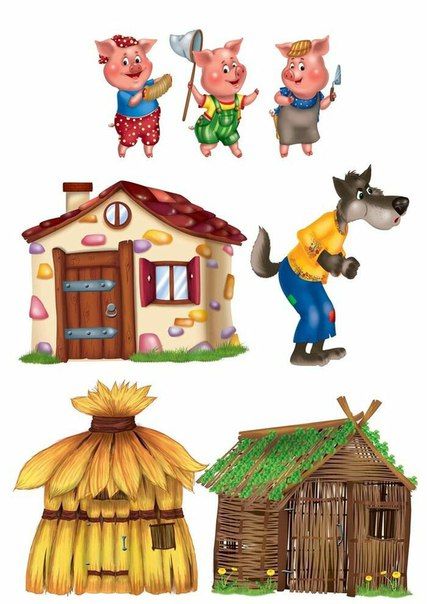
"We're toast!" sobbed Patty.
"Bacon, actually!" wailed Penny.
But slowly the three little pigs realized that the wolf had somehow gotten stuck before he had made it all the way down. Understanding what had happened, Penny started to giggle nervously. "I think he got caught in the crooked part of my chimney!"
Peter nodded with disbelief, jumped up and threw some wood onto the fireplace. Patty grabbed the matches and started a fire which was soon roaring. It didn't take long for the three little pigs to hear the anguished howl of the wolf as he scrambled back up the chimney. The flames licked his hairy coat and his tail became a flaming torch.
"Never again! Never again will I go down a chimney!" he squealed, as he tried to put out the flames in his tail. Then he ran away as fast as he could.
That very same day, Peter and Patty took out
library books on how to build a brick house.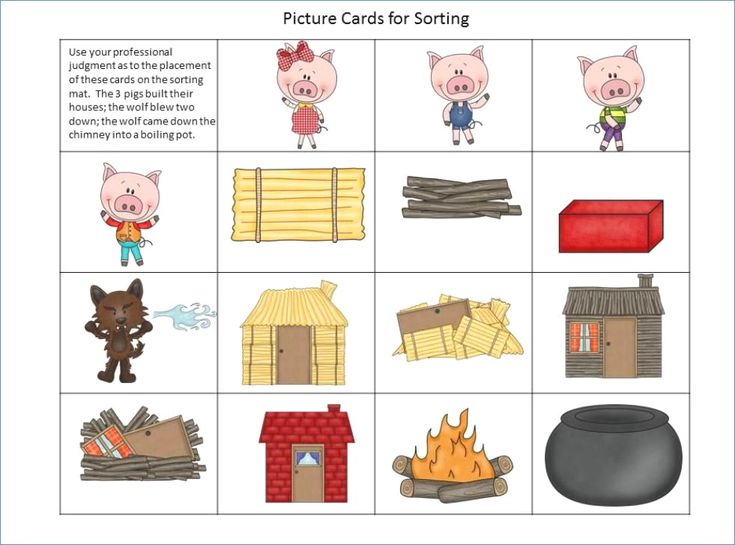 Penny did her best to give them some
instruction and Peter showed his sisters how to put on paint without it getting drippy
(after all, he WAS the oldest by 3 whole minutes).
Penny did her best to give them some
instruction and Peter showed his sisters how to put on paint without it getting drippy
(after all, he WAS the oldest by 3 whole minutes).
The wolf did return once to roam in the neighbourhood, but when he caught sight of THREE crooked chimneys, he remembered the terrible pain of a burnt tail and he left for good.
Now safe and happy, Penny sang out to her brother and sister, "No more working for today... Come on let's go out to play!"
Printable version of this story
<BACK
Why does the pig have a name? | Papmambuk
In the middle of the last century, the well-known child psychotherapist and psychoanalyst Bruno Bettelheim wrote the book On the Benefits of Magic, which interprets the plots of European folk tales. In particular, the English fairy tale "Three Little Pigs" ("Three Little Pigs").
Three pigs, according to Bettelheim, symbolize different stages of a child's development.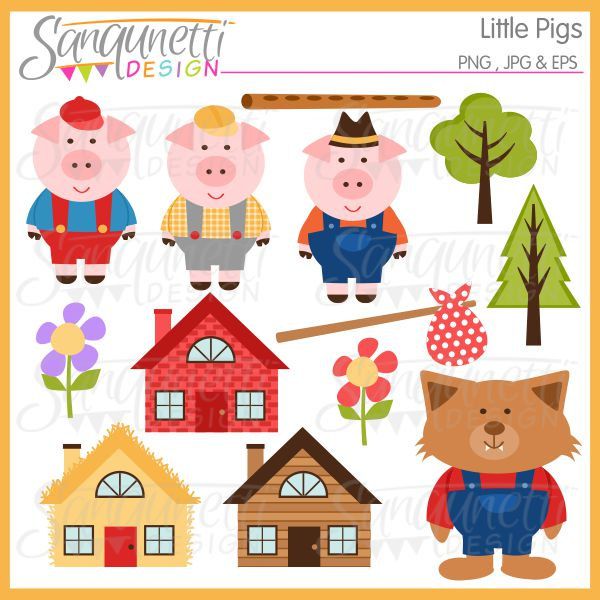
The life of a small child, according to the ideas of psychoanalysts, is subject to the principle of pleasure: I strive for what gives me pleasure. Getting pleasure is the main driving stimulus of life. At the same time, I demand pleasure immediately and do not understand, do not accept any delay in receiving pleasure.
With age, this principle of existence must be replaced by another: the child must learn to act on the principle of reality. Each of us wants to enjoy life. But the satisfaction of our desires may not always be instantaneous. Moreover, most often it is delayed. And, striving for pleasure, we must reckon with circumstances and with other people. Pleasure is not given to us just like that: in order to enjoy it, you need to make an effort.
This difficult transition from the pleasure principle to the reality principle, according to Bruno Bettelheim, is the story of the fairy tale "Three Little Pigs".
Two little pigs build their house from fragile materials: one from straw, the other from twigs.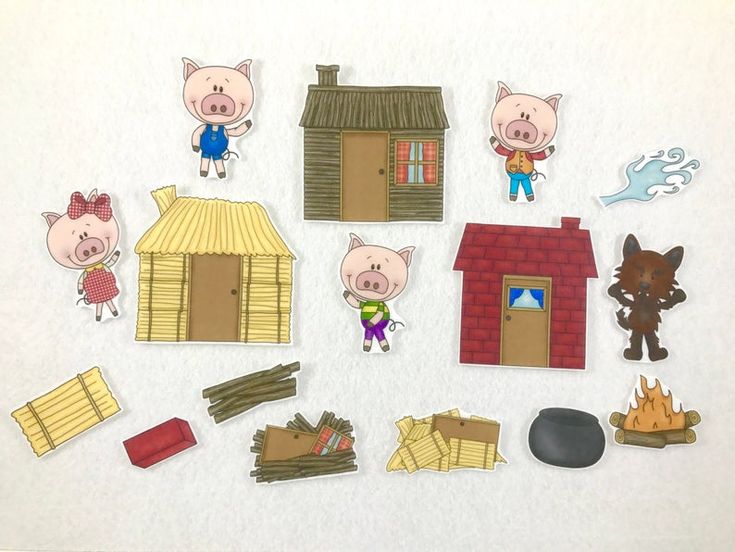 Both try to spend as little time and effort on this activity as possible and leave it at the first opportunity - to play. Two little pigs do not want (cannot) think about the future, about possible dangers. The main thing in their life is the momentary and quick satisfaction of emerging desires. True, the tale notes that the second piglet is still trying to build a house from something more solid than the younger one - there are signs of growing up! But they are not yet sufficiently expressed.
Both try to spend as little time and effort on this activity as possible and leave it at the first opportunity - to play. Two little pigs do not want (cannot) think about the future, about possible dangers. The main thing in their life is the momentary and quick satisfaction of emerging desires. True, the tale notes that the second piglet is still trying to build a house from something more solid than the younger one - there are signs of growing up! But they are not yet sufficiently expressed.
Only the third, oldest, piglet can already restrain his desires, can postpone the game for the sake of business. He is able to foresee the future and possible dangers. The older pig is even able to predict the behavior of the wolf. The wolf is an enemy, an insidious stranger who wants to seduce the pig, lure him into a trap. The wolf personifies everything asocial and unconscious and therefore has a terrible destructive power.
But the little pig is able to resist him - as our consciousness is capable of resisting our own unconscious impulses.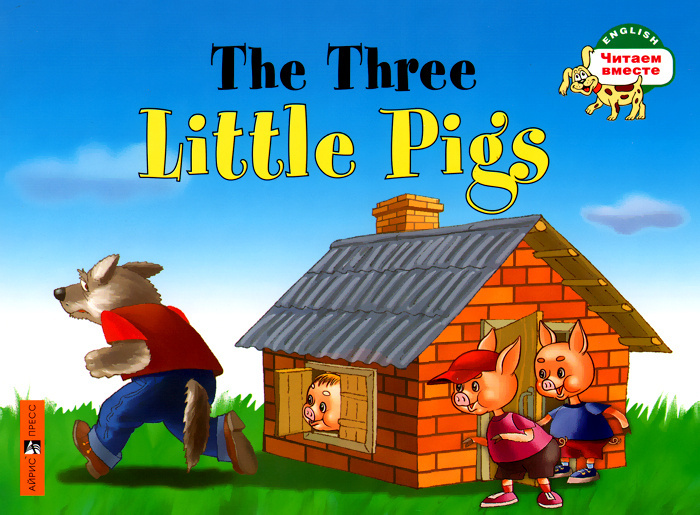 The piglet, with its reasonable, conscious actions, frustrates the plans of the enemy, far superior to him in ferocity and cruelty.
The piglet, with its reasonable, conscious actions, frustrates the plans of the enemy, far superior to him in ferocity and cruelty.
In each of us, says Bettelheim, live a wolf and a pig. And our psyche is the place of their competition in strength. The fairy tale informs the child about this in a figurative, fascinating form.
The actions of the piglets and the wolf are described tensely and dynamically: here the piglet is running away from the wolf, the wolf is chasing him. Here is a pig hiding in a house. The wolf puffs out his cheeks, blows, destroys the fragile pig house... All actions are understandable to the child, everything is imaginable - including the actions of the wolf. After all, the baby knows from his own experience what it means to destroy houses (for example, houses made of cubes). Therefore, he follows what is happening with awe and delight.
In an English folk tale, an evil wolf not only destroys a straw house, but also eats its owner, the first pig. Then he destroys the house of branches and eats the second pig. Only the third piglet manages to escape. Bettelheim believes that the defeat and disappearance of the first two piglets in the perception of the child is compensated by the fate of the third piglet: the first two, younger piglets must certainly disappear, as they represent the two early stages of development that the child must overcome.
Then he destroys the house of branches and eats the second pig. Only the third piglet manages to escape. Bettelheim believes that the defeat and disappearance of the first two piglets in the perception of the child is compensated by the fate of the third piglet: the first two, younger piglets must certainly disappear, as they represent the two early stages of development that the child must overcome.
The third piglet is perceived by the child as a successful transformation of the first two: if we want to rise to a higher level of development, we must part with early forms of behavior. The fact that the pigs in the folk tale do not have names helps the child to identify them with each other - and with himself. And "save" from the wolf in the form of the third pig.
The wolf fails to eat the third pig. This piglet - due to the fact that he is smarter and more mature than the first two - knows how to defend himself from the enemy. For the child listener, this is a comforting prospect: growing up is not bad at all.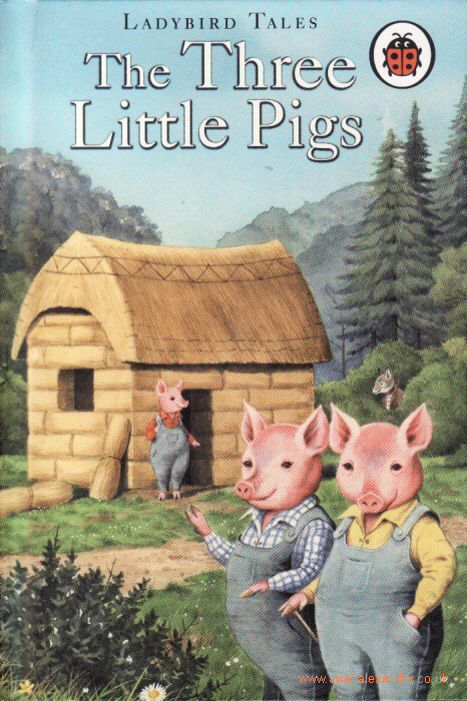
True, in an English fairy tale, a solid house does not give an absolute sense of security: the wolf does not stop trying to eat the pig. He knows that the piglet is greedy for tasty things, and he tries to lure him out of the safe stone house: first he invites him to go to the garden where the turnip has grown (and the owner is away), then to the garden where the apples have ripened, and finally to the fair, where there are a lot of temptations. But the piglet does not give in. He unravels the wolf's tricks and each time manages to get ahead of the wolf.
Unable to deceive the pig, the wolf decides to climb into his house through the pipe. He expects that the pig does not suspect anything and calmly went to bed. But he guesses about the intrigues of the wolf, melts the fireplace at an inopportune time and puts a cauldron of boiling water on fire. The wolf that climbed into the chimney falls into this cauldron. The pig tightly closes the cauldron with a lid, and the wolf turns .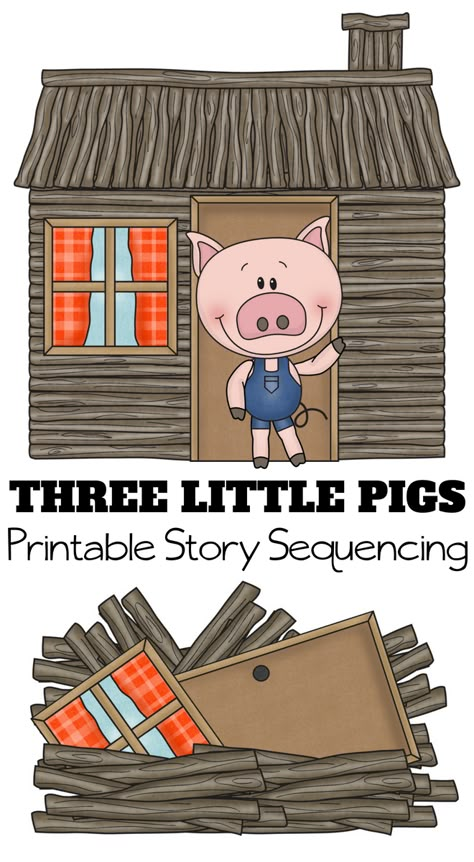 .. into boiled meat for the pig. Piglet, tying a napkin around his neck and armed with a knife and fork, dine on wolf meat. (There is nothing incredible about this, given that pigs are omnivores.)
.. into boiled meat for the pig. Piglet, tying a napkin around his neck and armed with a knife and fork, dine on wolf meat. (There is nothing incredible about this, given that pigs are omnivores.)
Bettelheim states that children perceive such an ending as a happy one. After all, the wolf had eaten two little pigs before. When he himself becomes food for the piglet, this is just retribution. The child agrees with such punishment. After all, the wolf is definitely bad. Moreover, the wolf personifies the bad that exists in the child himself. After all, a small child is familiar with the desire to destroy (as already mentioned, he watches the wolf with mixed feelings when he destroys the piglets' houses). But even a small child from some point is already able to feel: such a desire can turn into trouble for the destroyer. This feeling, this “guess”, the tale of the three little pigs confirms: one cannot be a greedy “devourer”.
The fairy tale "Three Little Pigs" makes the child think about his behavior, but does it gradually, without any moralizing.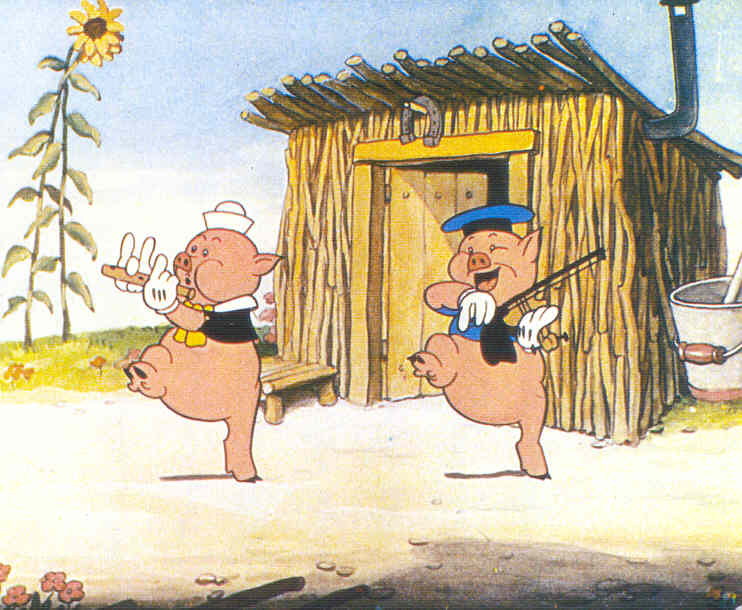 The child is given the opportunity to draw his own conclusions. “Only such a position contributes to the proper maturation of the child. To tell him directly how to behave means to burden the fetters of childish immaturity with the slavish fetters of the dictates of adults, ”writes Bettelheim.
The child is given the opportunity to draw his own conclusions. “Only such a position contributes to the proper maturation of the child. To tell him directly how to behave means to burden the fetters of childish immaturity with the slavish fetters of the dictates of adults, ”writes Bettelheim.
Therefore, one should speak with a child in the language of a fairy tale, and not in the language of moralizing.
***
The Soviet child was not familiar with the version of the fairy tale that Bruno Bettelheim analyzed in such detail. The "classic" version known to us belongs to Sergei Mikhalkov and is called "The Three Little Pigs". And this is a completely different story.
Pigs have names: Nif-Nif, Nuf-Nuf and Naf-Naf. And this author's decision leads to a semantic shift and a change in the plot.
Pigs that have names also have characters. The author - albeit in a few words - reports that Nif-Nif and Nuf-Nuf are frivolous and love to play. And Naf-Naf is serious and hardworking.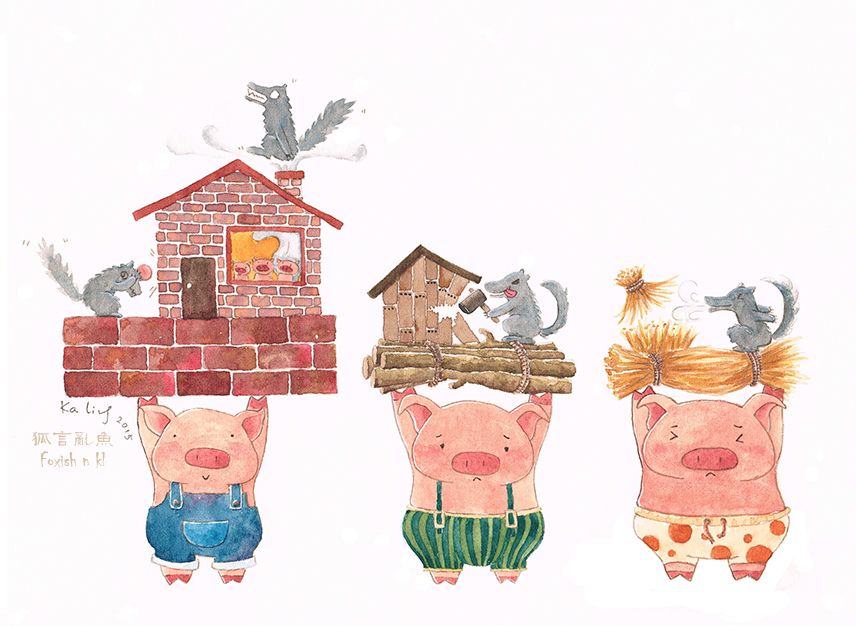 That is, Mikhalkov's piglets have individuality. Compared to them, the piglets from the folk tale are “under-incarnated” shadows. But it is precisely because of this non-incarnation that they can "merge" with each other in the child's imagination. That is why their disappearance is not a tragedy for the reader. And the child easily (as it seems to Bettelheim) should switch to the third pig, with which he is identified. Moreover, in the disappearance of the first two pigs, as already mentioned, there is a deep meaning.
That is, Mikhalkov's piglets have individuality. Compared to them, the piglets from the folk tale are “under-incarnated” shadows. But it is precisely because of this non-incarnation that they can "merge" with each other in the child's imagination. That is why their disappearance is not a tragedy for the reader. And the child easily (as it seems to Bettelheim) should switch to the third pig, with which he is identified. Moreover, in the disappearance of the first two pigs, as already mentioned, there is a deep meaning.
But letting a wolf eat a pig with a name and character is completely impossible - even if the pig is misbehaving. If the wolf in Mikhalkov's fairy tale had swallowed a piglet, this would have been perceived not as a logical consequence of unreasonable behavior, but as an adult's cruel treatment of a child (a piglet is a small child; a wolf is an adult, big and strong, who punishes the child). After all, the child-listener also often behaves badly or incorrectly. Is that what they eat? And in the fairy tale, moreover, bad behavior lies in the fact that the piglets want to play - that is, they do what is characteristic of the child and what is organic for him. Such a turn of events would be truly terrible. And it is unlikely that the child found the strength to perceive the tale as instructive: the image of cruelty has the property of capturing attention, fixing it on itself - that is, it is a very strong experience that obscures everything else.
Such a turn of events would be truly terrible. And it is unlikely that the child found the strength to perceive the tale as instructive: the image of cruelty has the property of capturing attention, fixing it on itself - that is, it is a very strong experience that obscures everything else.
Therefore, there is something terrible in the fairy tale (the wolf is still terrible), but it is weakened. The wolf never achieves its goal and in the end suffers a complete defeat, falling into the cauldron. However, here the author follows the principle of humanism: the scalded wolf safely jumps out of the cauldron and runs into the forest. The main result of the struggle: the wolf no longer annoys the piglets. About the pigs, it is reported that they understood everything, were re-educated and began to live together. Absolutely happy ending.
From the point of view of philosophy, the author's tale obviously loses depth in comparison with the folk tale. But in this case, if necessary, we can easily answer the disgusting school question: what is the story about and what does it teach? The answer is on the surface: you need to be hardworking, diligent, positive - like a Naf-Naf pig. In general, labor created man, and even a pig can do something decent.
In general, labor created man, and even a pig can do something decent.
When the content of a fairy tale is easily translated into the language of morality, it is no longer a fairy tale, but a fable. And if the "main idea" and "morality" were the main advantages of Mikhalkov's work, it would not be worth talking about him.
***
But put before us two versions of a fairy tale - folk and Mikhalkov's - which one will we choose for today's child?
I personally am Mikhalkovsky. With all my reverent attitude towards Bettelheim. Moreover, Bettelheim's book for me is a textbook on understanding fairy-tale material and the ability to measure it with the child's psyche.
For a child of two and a half - three years old, I will choose the Mikhalkov version, where funny piglets are described so colorfully and vividly; where they, having defeated the wolf, do not eat it, but sing a song. I think that the English folk tale was originally addressed not to small children, but to adults.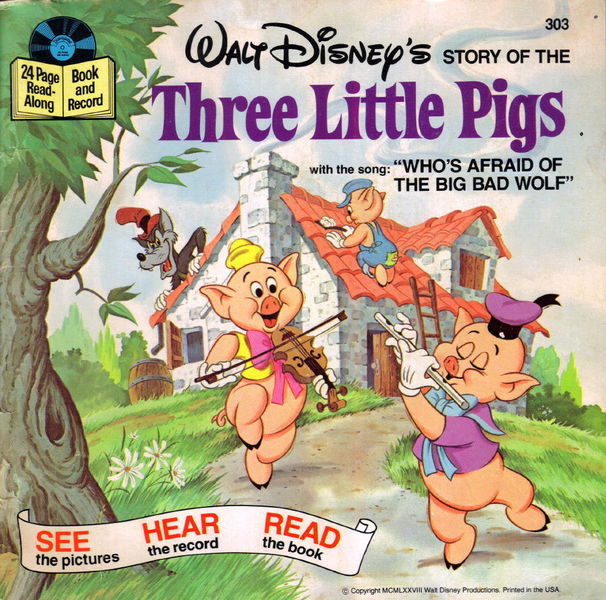 When she entered the circle of children's reading, it was also not about toddlers, but about children who had reached at least five years of age, or even six years of age - the period when, on the one hand, the idea of the principle of reality becomes relevant, and on the other hand, there is a request for scary tales.
When she entered the circle of children's reading, it was also not about toddlers, but about children who had reached at least five years of age, or even six years of age - the period when, on the one hand, the idea of the principle of reality becomes relevant, and on the other hand, there is a request for scary tales.
The shift made by Sergey Mikhalkov allowed the fairy tale about piglets to descend to the lower age level. The story has been redirected. Now it is best to read it to three-year-olds. And three-year-olds will most safely ignore the moralism of the Soviet version. For them - people with psychomotor intelligence and cognizing the world around them through movement - it is important that there are many exciting actions in the fairy tale. Pigs play, build houses, run away from the wolf, hide; the wolf breaks houses, climbs somewhere, falls somewhere and also runs away - and all this is recognizable, interesting, dynamic. This is a real adventure story, a thriller for the little ones.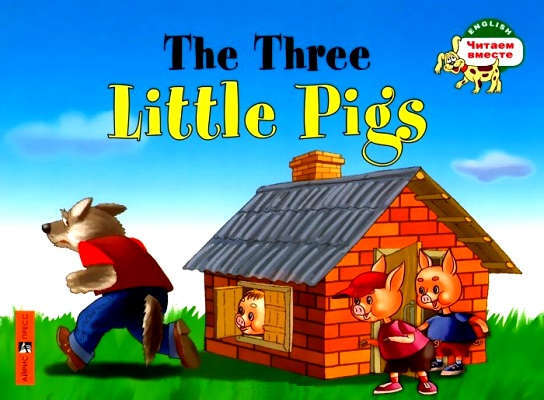 And a happy ending - an unconditional happy ending - is another confirmation of the stability of the world. No creature that has a name should disappear from it. No play-loving pig.
And a happy ending - an unconditional happy ending - is another confirmation of the stability of the world. No creature that has a name should disappear from it. No play-loving pig.
And I will also choose the Mikhalkov version for the very individualization of the images that the author carried out when retelling a folk tale.
Folklore can be considered the soil from which literature in general and children's literature in particular grew (this was brilliantly proved in their time by K. Chukovsky and S. Marshak). But modern literature cannot but take into account the new psychological needs of the reader. And these requests are connected with the awareness of one's own separateness, individuality and its value. Therefore, endowing the characters with individual characteristics and characters is the main trend in the development of a fairy tale in the 20th century.
As for the folk tale, it seems to me that it would be right and interesting to offer it for comparison with the Mikhalkov version for children of nine or ten years old.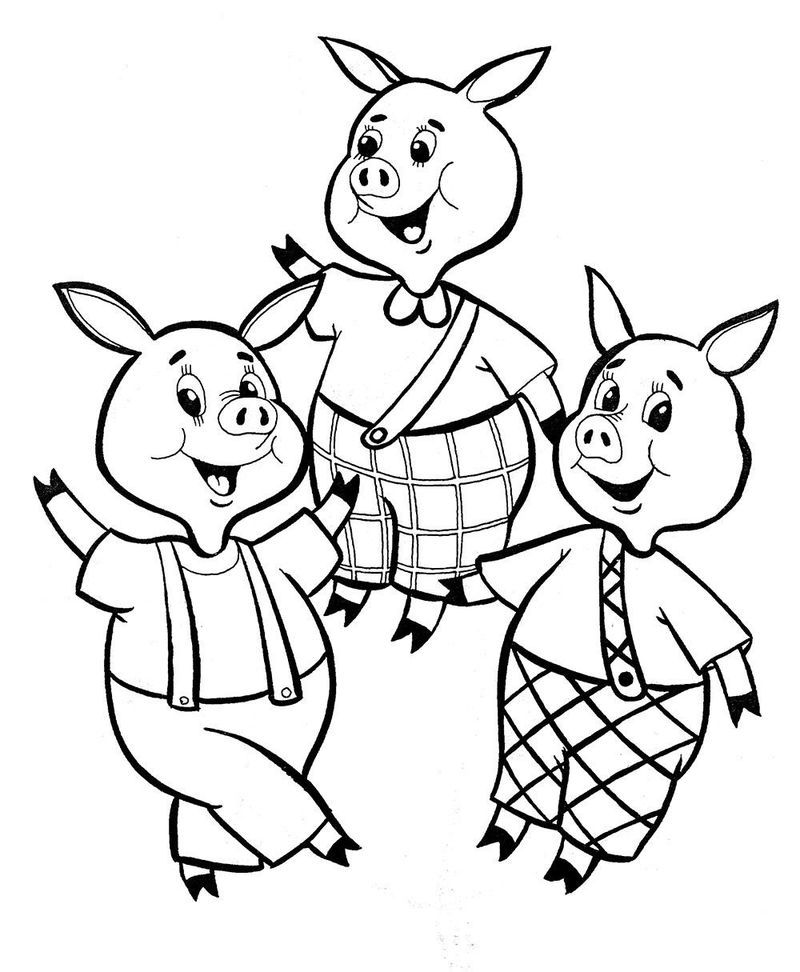 Why not an introduction to literary criticism?
Why not an introduction to literary criticism?
Marina Aromshtam
The English folk tale described by Bruno Bettelheim has not been translated into Russian. Only her adapted retellings exist. So, for example, the Ripol Classic publishing house published the fairy tale The Three Little Pigs (illustrations by E. Bulatov and O. Vasiliev) with a text based on an English folk tale.
Tale Three little pigs - read online
Once upon a time there were three little pigs in the world. Three brothers.
All the same height, round, pink, with the same funny ponytails. Even their names were similar. The piglets were called: Nif-Nif, Nuf-Nuf and Naf-Naf.
All summer they tumbled in the green grass, basked in the sun, basked in the puddles.
But autumn has come.
The sun was not so hot anymore, gray clouds stretched over the yellowed forest.
- It's time for us to think about winter, - Naf-Naf once said to his brothers, waking up early in the morning.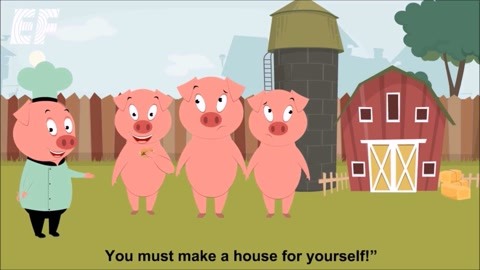 - I'm shivering from the cold. We may catch a cold. Let's build a house and winter together under one warm roof.
- I'm shivering from the cold. We may catch a cold. Let's build a house and winter together under one warm roof.
But his brothers didn't want to take the job. It is much more pleasant to walk and jump in the meadow on the last warm days than to dig the earth and carry heavy stones.
- We'll make it! Winter is still far away. We'll take a walk, - said Nif-Nif and rolled over his head.
— When necessary, I will build a house for myself, — said Nuf-Nuf and lay down in a puddle.
“Me too,” added Nif-Nif.
- Well, as you wish. Then I will build my own house, - said Naf-Naf. “I won't wait for you.
It was getting colder and colder every day. But Nif-Nif and Nuf-Nuf were in no hurry. They didn't even want to think about work. They were idle from morning to evening. All they did was play their pig games, jump and roll.
“Today we will take a walk,” they said, “and tomorrow morning we will get down to business.
But the next day they said the same thing.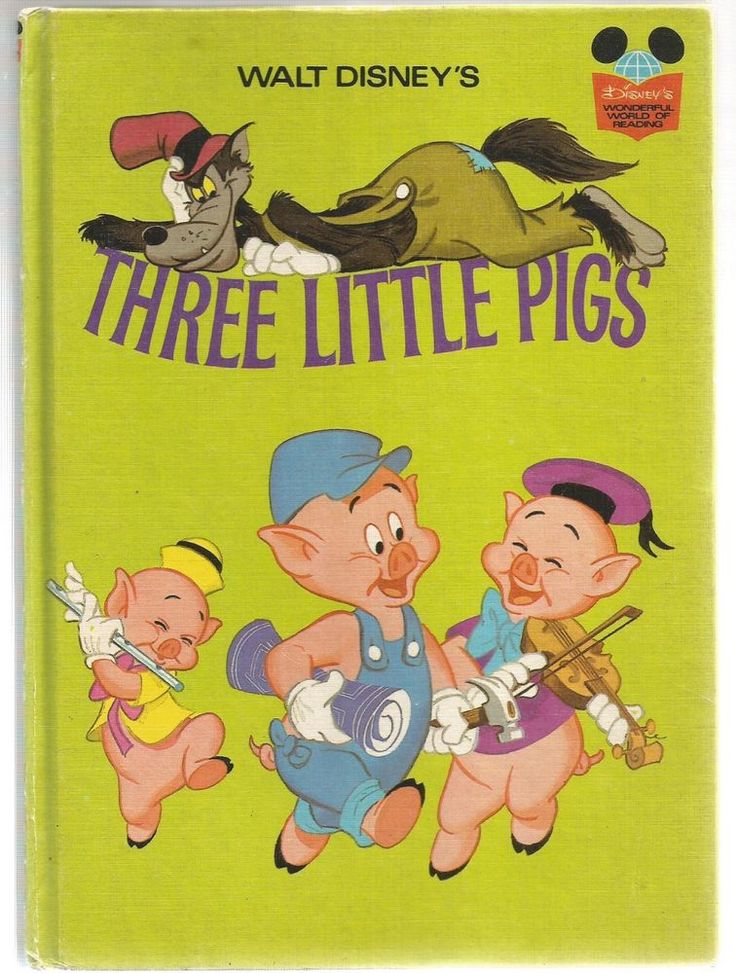
And only when a large puddle by the road began to be covered with a thin crust of ice in the morning, the lazy brothers finally got to work.
Nif-Nif decided that it would be easier and most likely to make a house out of straw. Without consulting anyone, he did just that. By evening, his hut was ready.
Nif-Nif put the last straw on the roof and, very pleased with his house, sang merrily:
You can get around half the world,
Get around, get around,
You won't find a better home,
You won't find it, you won't find it!
Singing this song, he went to Nuf-Nuf.
Nuf-Nuf was also building a house not far away. He tried to finish this boring and uninteresting business as soon as possible. At first, like his brother, he wanted to build a house out of straw. But then I decided that it would be very cold in such a house in winter. The house will be stronger and warmer if it is built from branches and thin rods.
So he did.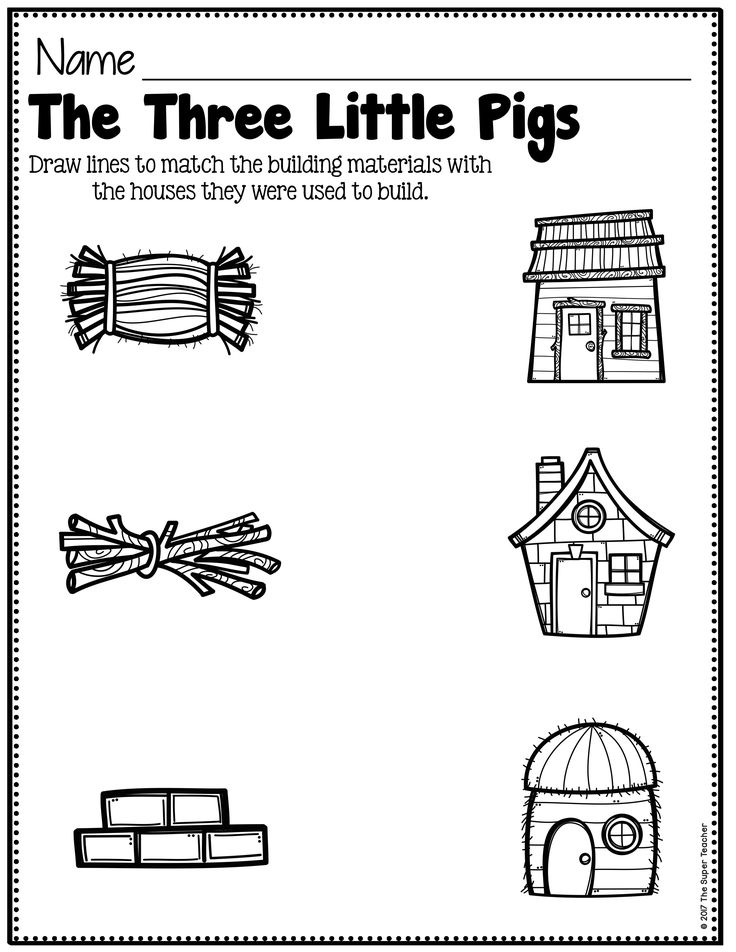
He drove stakes into the ground, intertwined them with rods, heaped dry leaves on the roof, and by evening the house was ready.
Nuf-Nuf proudly walked around him several times and sang:
I have a good house,
New home, solid home,
I'm not afraid of rain and thunder,
Rain and thunder, rain and thunder!
Before he could finish the song, Nif-Nif ran out from behind a bush.
— Well, your house is ready! - said Nif-Nif to his brother. "I told you we'd get it over with quickly!" Now we are free and can do whatever we want!
— Let's go to Naf-Naf and see what kind of house he built for himself! - said Nuf-Nuf. "We haven't seen him in a long time!"
— Let's go and see! Nif-Nif agreed.
And both brothers, very pleased that they did not have to worry about anything else, disappeared behind the bushes.
Naf-Naf has been busy building for several days now. He dragged stones, kneaded clay, and now slowly built himself a reliable, durable house in which one could hide from wind, rain and frost.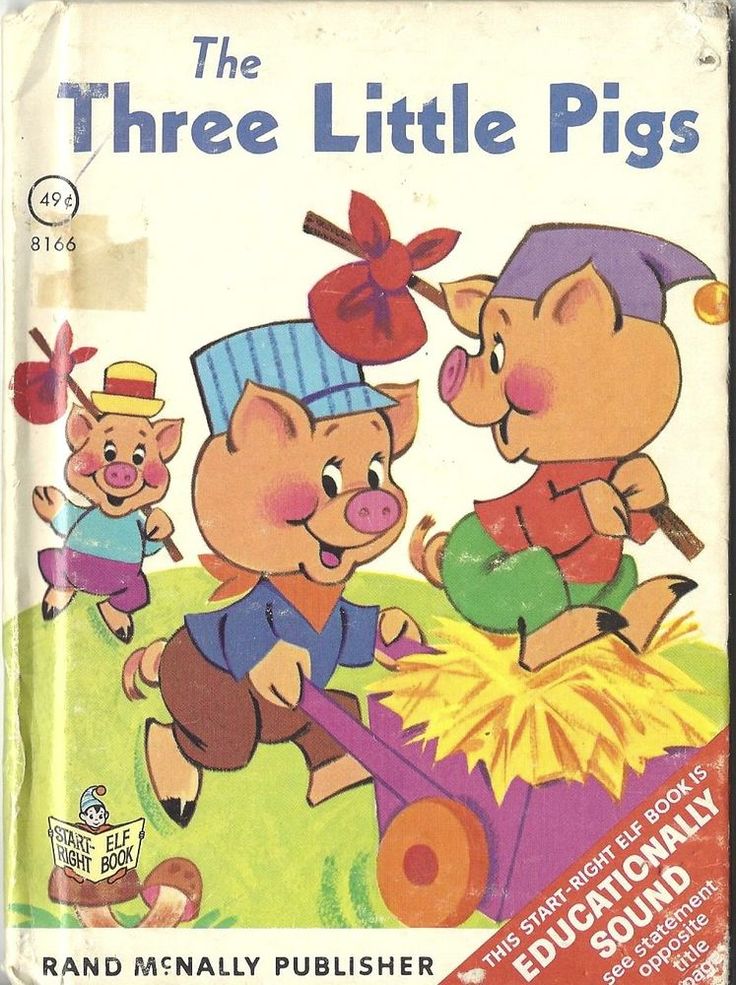
He made a heavy oak door with a bolt in the house so that the wolf from the neighboring forest could not climb up to him.
Nif-Nif and Nuf-Nuf found their brother at work.
— What are you building? - the surprised Nif-Nif and Nuf-Nuf shouted in one voice.
— Is it a pig house or a fortress?
— Piglet's house should be a fortress! Naf-Naf calmly answered them, continuing to work.
— Are you going to fight with someone? Nif-Nif grunted merrily and winked at Nuf-Nuf.
And both brothers were so merry that their squeals and grunts carried far across the lawn.
And Naf-Naf, as if nothing had happened, continued to lay the stone wall of his house, humming a song under his breath
I, of course, am smarter than everyone else,
Smarter than everyone, smarter than everyone!
I build a house from stones,
From stones, from stones!
No animal in the world,
Cunning Beast, Scary Beast,
Will not break through this door,
Through this door, through this door!
— What animal is he talking about? - Nif-Nif asked Nuf-Nif.
— What animal are you talking about? - Nuf-Nuf asked Naf-Naf.
- I'm talking about the wolf! - answered Naf-Naf and laid another stone.
- Look how afraid he is of the wolf! - said Nif-Nif.
- He's afraid of being eaten! - added Nuf-Nuf.
And the brothers cheered even more.
- What kind of wolves can be here? - said Nif-Nif.
- There are no wolves! He's just a coward! - added Nuf-Nuf.
And they both began to dance and sing:
We are not afraid of the gray wolf,
Gray wolf, gray wolf!
Where do you go, stupid wolf,
Old wolf, dire wolf?
They wanted to tease Naf-Naf, but he didn't even turn around.
- Let's go, Nuf-Nif, - said then Nif-Nif. “We have nothing to do here!
And two brave brothers went for a walk. On the way they sang and danced, and when they entered the forest, they made such a noise that they woke up the wolf, who was sleeping under a pine tree.
— What's that noise? - the angry and hungry wolf grumbled with displeasure and galloped to the place where the squealing and grunting of two small, stupid pigs could be heard.
- Well, what kind of wolves can be here! - said at that time Nif-Nif, who saw wolves only in pictures.
- Here we will grab him by the nose, he will know! added Nuf-Nuf, who also had never seen a live wolf.
And the brothers rejoiced again and sang:
We are not afraid of the gray wolf,
Gray wolf, gray wolf!
Where do you go, stupid wolf,
Old wolf, dire wolf?
And suddenly they saw a real live wolf!
He stood behind a large tree, and he had such a terrible look, such evil eyes and such a toothy mouth that a chill ran down Nif-Nif and Nuf-Nuf's backs and thin tails trembled finely, finely. The poor pigs couldn't even move for fear.
The wolf got ready to jump, snapped his teeth, blinked his right eye, but the piglets suddenly came to their senses and, squealing throughout the forest, rushed to their heels. They have never run so fast before! Sparkling with their heels and raising clouds of dust, the piglets each rushed to their home.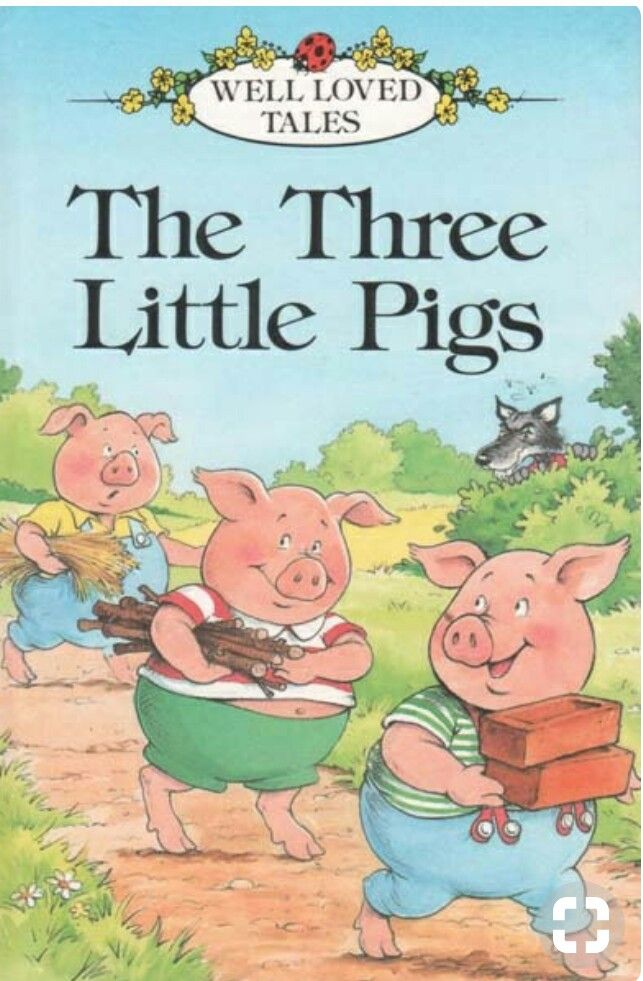
Nif-Nif was the first to reach his thatched hut and barely managed to slam the door in front of the wolf's very nose.
— Unlock the door now! the wolf growled. “Or else I’ll break it!”
— No, — grunted Nif-Nif, — I won't unlock it!
The breath of a terrible beast was heard outside the door.
— Unlock the door now! the wolf growled again. “Otherwise I’ll blow so hard that your whole house will fly apart!”
But Nif-Nif, out of fear, could no longer answer anything.
Then the wolf began to blow: “F-f-f-w-w-w!”.
Straws flew from the roof of the house, the walls of the house shook.
The wolf took another deep breath and blew a second time: “F-f-f-w-w-w!”. When the wolf blew for the third time, the house was blown in all directions, as if it had been hit by a hurricane. The wolf snapped his teeth in front of the little piglet's snout. But Nif-Nif deftly dodged and rushed to run. A minute later he was already at the door of Nuf-Nuf.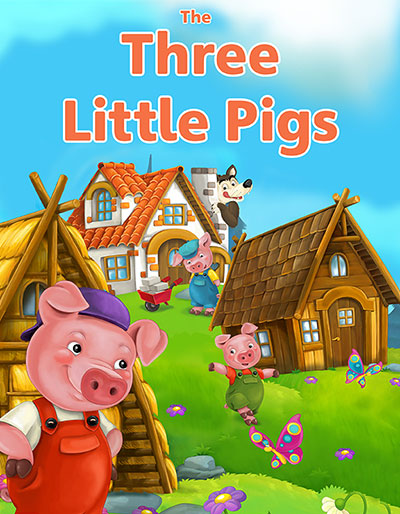
As soon as the brothers locked themselves in, they heard the wolf's voice:
— Well, now I'll eat you both!
Nif-Nif and Nuf-Nuf looked at each other in fear. But the wolf was very tired and therefore decided to go for a trick.
- I changed my mind! he said so loudly that he could be heard in the house. “I won’t eat those skinny piglets!” I better go home!
Did you hear? - Nif-Nif asked Nuf-Nif. He said he won't eat us! We are skinny!
- This is very good! - Nuf-Nuf said and immediately stopped trembling.
The brothers became cheerful and sang as if nothing had happened:
We are not afraid of the gray wolf,
Gray wolf, gray wolf!
Where do you go, stupid wolf,
Old wolf, dire wolf?
And the wolf didn't even think of going anywhere. He just stepped aside and hunkered down. He was very funny. He had a hard time keeping himself from laughing. How cleverly he deceived two stupid little pigs!
When the pigs were completely calm, the wolf took the sheep's skin and cautiously crept up to the house.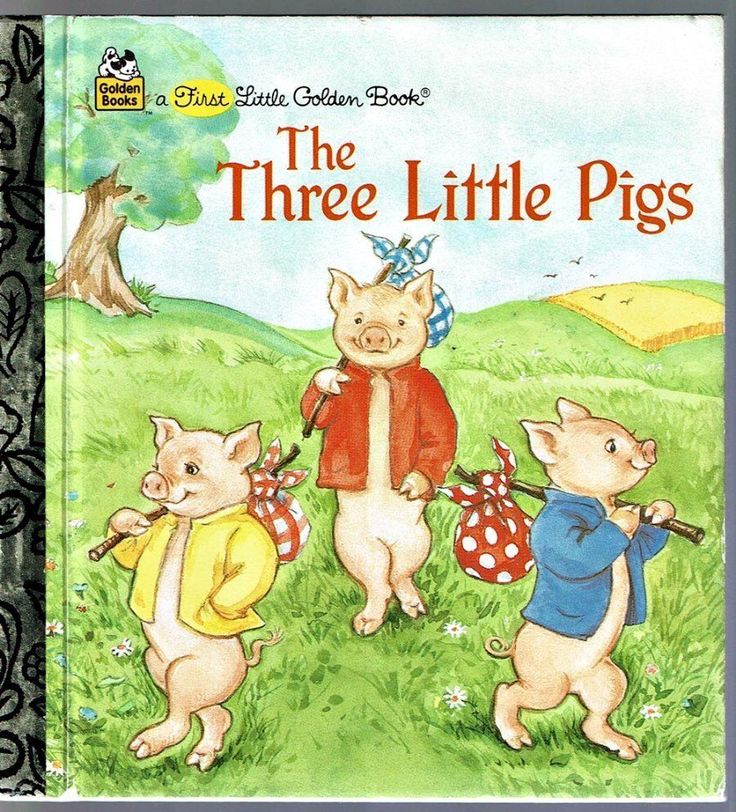 At the door, he covered himself with skin and knocked softly.
At the door, he covered himself with skin and knocked softly.
Nif-Nif and Nuf-Nuf were very frightened when they heard the knock.
Who is there? they asked, their tails shaking again.
- It's me-me-me - poor little sheep! the wolf squeaked in a thin, alien voice. - Let me spend the night, I strayed from the herd and very tired!
— Let me in? the good Nif-Nif asked his brother.
- You can let the sheep go! Nuf-Nuf agreed. - A sheep is not a wolf!
But when the pigs opened the door, they saw not a sheep, but the same toothy wolf. The brothers slammed the door and leaned on it with all their might so that the terrible beast could not break into them.
The wolf is very angry. He failed to outsmart the pigs! He threw off his sheepskin and growled:
— Well, wait a minute! There will be nothing left of this house!
And he began to blow. The house leaned a little. The wolf blew a second, then a third, then a fourth time.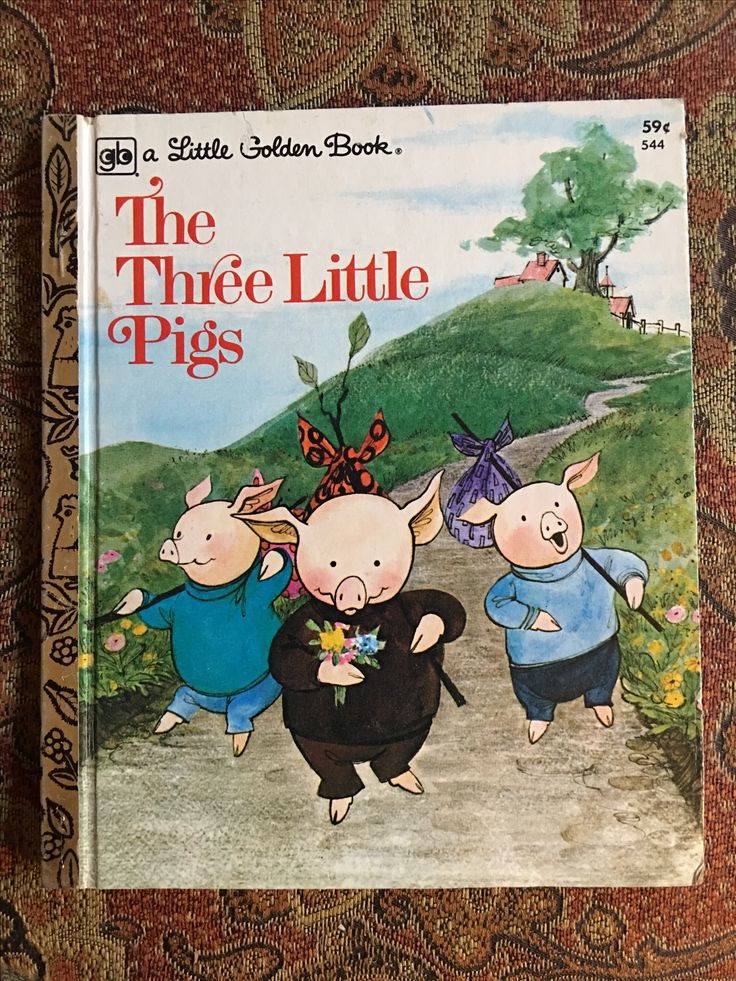
Leaves were falling from the roof, the walls were trembling, but the house was still standing.
And only when the wolf blew for the fifth time did the house stagger and fall apart. Only one door still stood for some time in the middle of the ruins.
The pigs ran away in terror. Their legs were paralyzed with fear, every bristle trembled, their noses were dry. The brothers rushed to the house of Naf-Naf.
The wolf overtook them with huge leaps.
Once he almost grabbed Nif-Nif by the hind leg, but he pulled it back in time and added speed.
The wolf also pressed on. He was sure that this time the piglets would not run away from him.
But again, he was out of luck.
The piglets quickly rushed past a large apple tree without even hitting it. But the wolf did not have time to turn and ran into an apple tree, which showered him with apples.
One hard apple hit him between the eyes. A large lump jumped up on the wolf's forehead.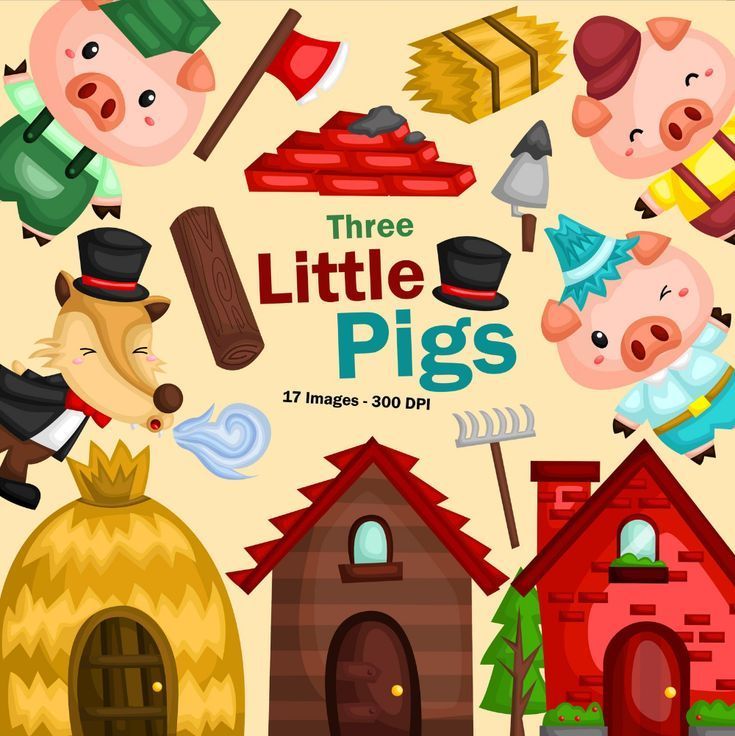
And Nif-Nif and Nuf-Nuf, neither alive nor dead, ran up to the house of Naf-Naf at that time.
Brother quickly let them into the house. The poor piglets were so frightened that they could not say anything. They silently rushed under the bed and hid there. Naf-Naf immediately guessed that a wolf was chasing them. But he had nothing to fear in his stone house. He quickly bolted the door, sat down on a stool himself, and sang loudly:0003
No animal in the world,
Cunning Beast, Scary Beast,
Will not open this door,
This door, this door!
But just then there was a knock on the door.
Who is knocking? Naf-Naf asked in a calm voice.
- Open without talking! came the rough voice of the wolf.
- No matter how! And I don't think so! - Naf-Naf answered in a firm voice.
- Oh, yes! Well, hold on! Now I'll eat all three!
- Try it! - answered Naf-Naf from behind the door, not even getting up from his stool.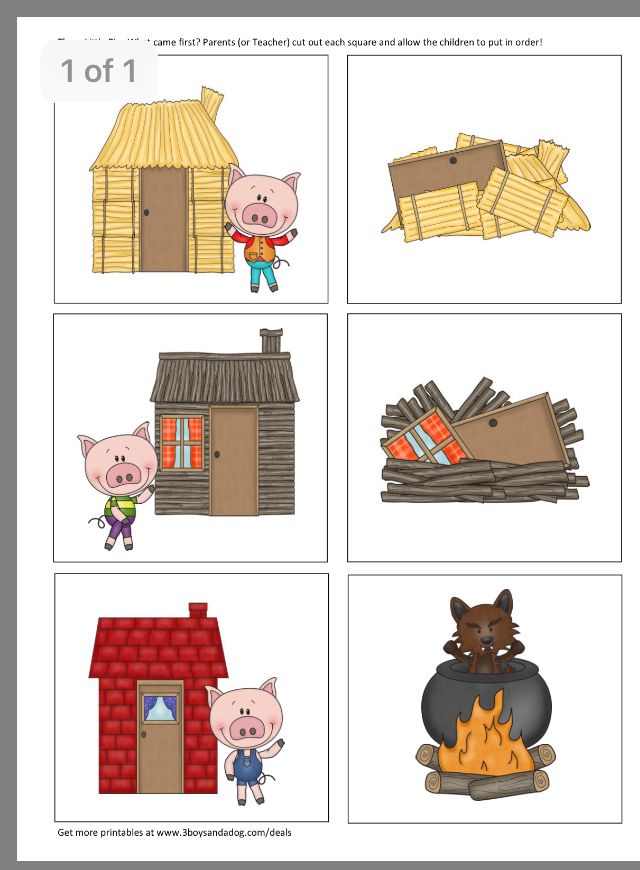 He knew that he and his brothers had nothing to fear in a solid stone house.
He knew that he and his brothers had nothing to fear in a solid stone house.
Then the wolf sucked in more air and blew as hard as he could! But no matter how much he blew, not even the smallest stone moved.
The wolf turned blue from the effort.
The house stood like a fortress. Then the wolf began to shake the door. But the door didn't budge either.
The wolf, out of anger, began to scratch the walls of the house with his claws and gnaw at the stones from which they were built, but he only broke off his claws and ruined his teeth. The hungry and angry wolf had no choice but to get out.
But then he raised his head and suddenly noticed a large, wide chimney on the roof.
- Yeah! Through this pipe I will make my way into the house! the wolf rejoiced.
He carefully climbed onto the roof and listened. The house was quiet.
“I'm still going to have a bite of fresh piglet today,” thought the wolf, and after licking his lips, climbed into the pipe.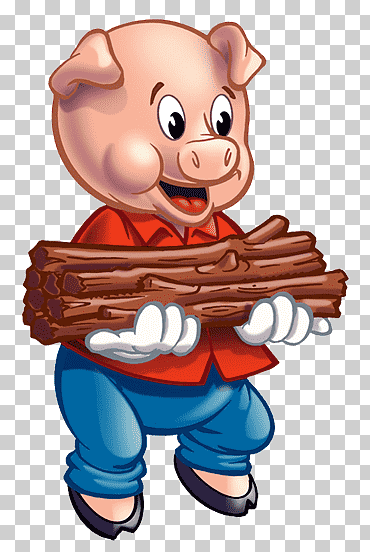
But as soon as he began to descend the pipe, the piglets heard a rustle.
And when soot began to fall on the lid of the boiler, smart Naf-Naf immediately guessed what was the matter.
He quickly rushed to the cauldron in which water was boiling on fire and tore off the lid.
- Welcome! - said Naf-Naf and winked at his brothers.
Nif-Nif and Nuf-Nuf have already completely calmed down and, smiling happily, looked at their smart and brave brother.
The piglets did not have to wait long. Black as a chimney sweep, the wolf flopped right into the boiling water.
Never before had he been in so much pain!
His eyes popped out on his forehead, all his hair stood on end.
With a wild roar, the scalded wolf flew into the chimney back to the roof, rolled down it to the ground, rolled four times over his head, rode his tail past the locked door and rushed into the forest.
And the three brothers, the three little pigs, looked after him and rejoiced that they had taught the evil robber so cleverly.